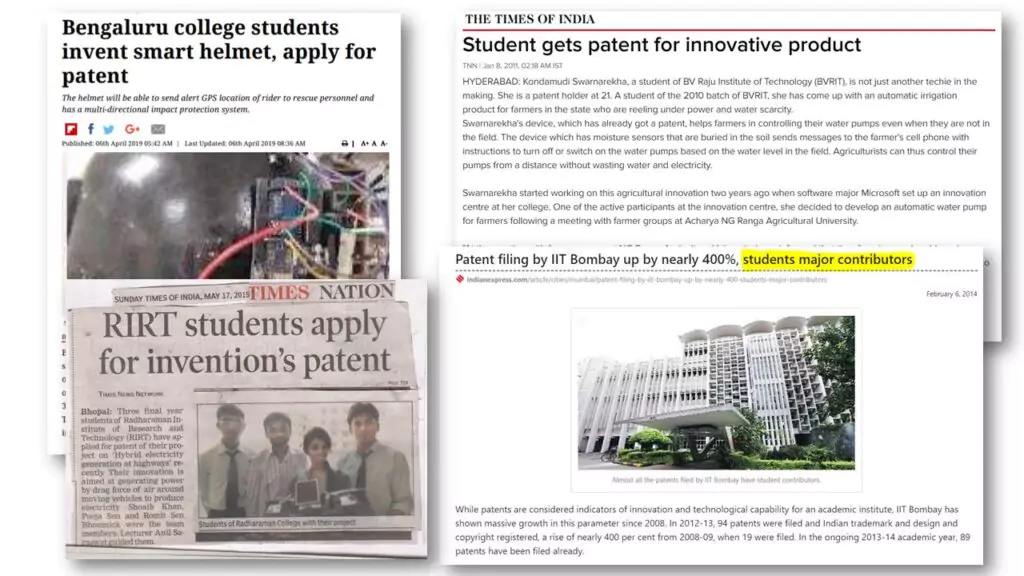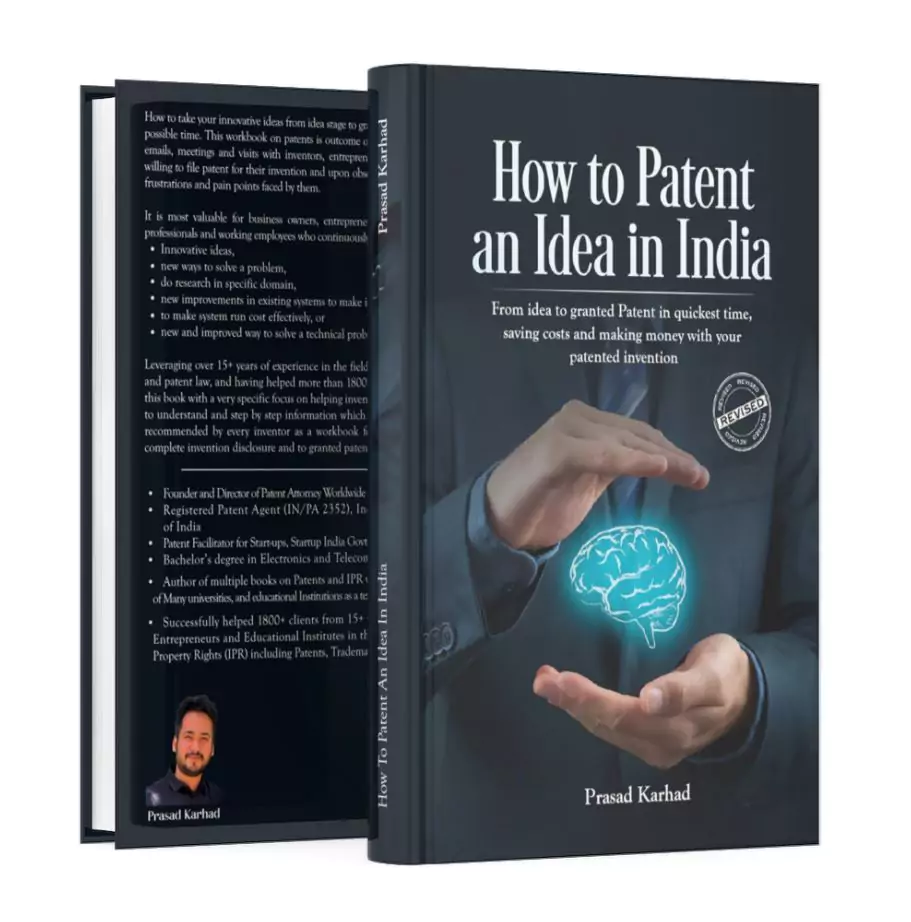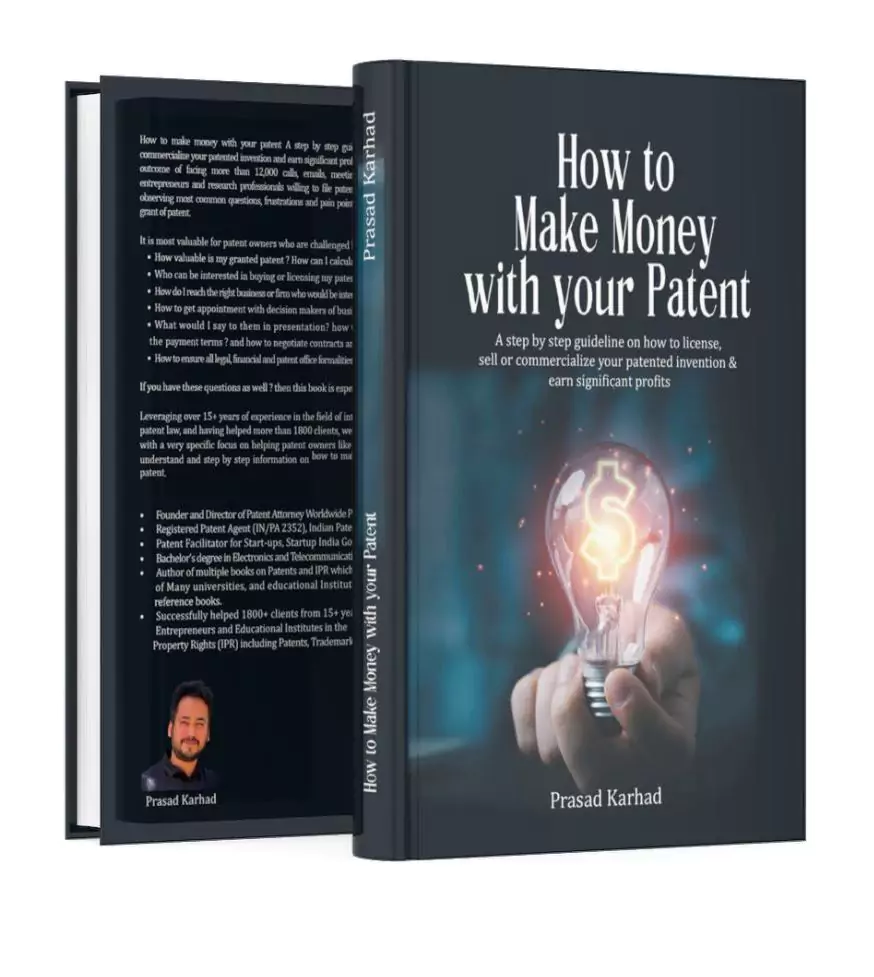Increase the number of Patents by your Educational Institute
Books are specially designed for Creating a Culture of :
- Identifying ideas, inventions, and research projects worth a patent
- Quickly moving from idea to patent filed to patent granted stages
- Commercializing patents by licensing or selling patents to the right businesses
which helps in increasing the number of patents filed, granted, and commercialized by an educational institute.
Books from Prasad Karhad are Already included in syllabus of many educational institutions as textbooks or reference books on subject of Intellectual property rights and Patents
- Text book : BA.LLB (HONS) – VII-Semister Patent Laws and technology transfer at Vignan’s Foundation for Science, Technology and Research Link here
- Reference Book : Government College of Engineering, Aurangabad (page 13) Link here
- Reference book : Kakatiya Institute of Technology & Science, Warangal (page 26) link here
Importance of Patents For Educational Institutes
We all know the importance of a number of patents filed, granted, and commercialized for an educational institute, universities and colleges :
- University Grants Commission (UGC) has now asked all universities in India to set up Intellectual Property (IP) Centres
- National Institutional Ranking Framework (NIRF) rankings: The number of patents applied for, granted, and commercialized by universities and institutes is factored in in the National Institutional Ranking Framework (NIRF) rankings
- The number of Patents filed, granted, and commercialized plays a crucial role in improving the rankings of Educational Institutes.

For Teachers and Students: Having a patent filed or granted on your name means appreciation, news and media attention, and even promotions!!!
Does your Institute also face these Challenges?
- We have too many good ideas, projects and inventions but very few Granted Patents?
- No one exactly knows if their idea, invention or project would be eligible for patent or not?
- Faculty members struggle to move quickly from idea stage to getting granted patent due to lack of clarity and lack of knowledge on what, when, and how to do it?
- Many have False belief that patent filing is for very complex inventions, is very expensive, time consuming (take years) and only to be done by big budget firms or institutes?
- How to calculate the value of granted patent and what is target market for selling it?
- How to find buyer of licensee business interested in our granted patents?
- How to sell or License granted patents and make profits?
In last 15+ years upon handling 12,000+ calls, emails, questions, meetings and discussion with inventors willing to file patent in India, we have repeatedly observed some missing pieces of information or understanding about: “How to take an invention, project fromIdea stage to a Granted Patent stage, in quickest timewith less efforts and avoiding time consuming mistakes And with lowest possible costs.” Let’s take an example;
Have you ever got an Innovative idea about a project? or research? What happens to those innovative ideas?

- You may get excited by the idea at first, and talk to your colleagues, friends and seniors
- You would go online and search for the information about that innovative idea;
- chances are you will see thousands of results in google that are something similar to your innovative idea;
- And… Many times you get discouraged and quit following up with that idea!!! Not even realizing, your innovative idea might have “novelty” and “inventive step” which may get a Granted patent in India for your invention.
“ Patents are not only given for “ground breaking” or completely new inventions that change the world, But many times Patents are also granted for incremental inventions that can be a small but significant improvement in existing technology or solutions.”
These books are an answer to such real life questions from inventors and researchers like:
- How to I know if my idea or invention is patentable or not?
- How to go from idea to granted patent ? what are steps ?
- What is the amount of information needed to write patent? Is working model required?
- How do I know if my invention has novelty or not? Can I do Novelty search on my own?
- Can I write patent on my own, what are guidelines to write patent for my invention that I can follow and be able to write a patent application?
- How to file patent? what documents are required, where to file it?
- What to do when my patent is granted
- How to enforce my patent rights and what are the remedies and defenses available in case of infringement
- How to make money from licensing or selling my patented invention? Etc…
Short videos about book content
Youtube channel https://www.youtube.com/@Patentattorneyworldwide
These books are specially designed to create a culture of Patents in your Educational Institute

- Identifying ideas, inventions, and research projects worth a patent
- Quickly moving from idea to patent filed to patent granted stages
- Commercializing patents by licensing or selling patents to right businesses
Many colleges and universities are already utilizing this information to enhance and expand their collections of patents. It would be like installing software in your brain about the wisdom about patents and building the right mindset; a software that will continuously help you in:
- Spot the opportunities to secure patents for your innovative ideas that are novel, inventive and useful in your field of technology
- Identify the innovative ideas at the inception level and document them properly in the form of invention disclosures
- Take informed and speedy actions to file patent applications for your inventions in India and abroad, following the legal requirements and procedures
- Save costs and time along the way by minimizing mistakes and avoiding common pitfalls in the patent process
- Ultimately get paid for your patented inventions by utilizing strategies to monetize them, such as licensing, selling, or building business around patented invention.
- Unlocking the True Potential and Real Value of Your Patent, identifying Potential Buyers or Licensees for Your Patent
- Strategizing Approaches to Engage the Right Businesses or Firms for licensing or selling patent, securing Appointments & Meetings with Key Decision-Makers call scripts and email templates, crafting an Effective Presentation and Mastering Negotiation Tactics
- Finalizing Terms of Agreement or Contract Successfully, understanding Legal, Financial, and Patent Office Procedures upon licensing or selling patent.
You do not have to decide right now: we have a 100% Refund policy
You can order these books from Amazon, it has a total Money back guarantee. It is completely risk-free to order and evaluate, and if you feel that it is not providing value as we promised, you can return it back to Amazon and your complete money will be refunded.
We have discounted prices for bulk orders in quantity of 5, 10, 20 books
Discounted Patent Fees for colleges and Educational institutes
Below are discounted patent attorney fees of getting a Patent in India
- Patent attorney fees for Patent drafting is ₹ 20,000
₹ 30,000 - total official fees for patents by expedited (fast route) ₹ 12,100 ( this includes Filing fees ₹1600 + Early publication ₹2500 + Expedited (fast) examination ₹8000)
After 6 to 8 months
- If First Examination is Received – Patent attorney fees for responding to FER is ₹ 12,000
₹ 15000 - If the Hearing is required with the patent office – Patent attorney charges would be ₹ 12,000
₹ 15000
Assumptions: This is assuming the applicant is a Natural person(s) or Startup(s) or Small entit(y)/(ies) or educational institution(s) and we choose to take an expedited route for a faster grant of patent hence filing early publication and expedited examination requests.
There are two elements for the cost of getting a patent/filing patent in India:
- The Government fees for Forms, requests, and renewals.
- Professional Charges for patent professional, patent agent/attorney
The cost for Patent in table format :
Note: steps highlighted in Orange color are either optional step or depends on case to case and are not mandatory to happen
| Sr. | Stages for Patent (click links below for more details in videos or articles ) | Professional fees | Government Fees for (Natural person or Startup or Small entity or educationalinstitution) | Time required |
| 1 | How to go from Idea toInvention disclosure ? Do I need patent agent of attorney Is my invention patentable ? | – | – | – |
| 2 | Signing Non-Disclosure Agreement (NDA) | – | – | 10 minutes to sign |
| 3 | Patentability / Novelty Search (Optional step) | ₹ 12,000 | – | 3 – 5 days |
| 4 | Drafting Complete Patent Application | ₹ 20,000 | – | 10 – 12 days |
| 5 | Filing patent application | – | ₹ 1,600 | 1 – 2 days |
| 6 | Publication of patent application | – | – | After 18 months |
| 7 | Early publication (Optional step) | ₹ 2500 | 1 – 2 months | |
| 8 | Request For examination (Normal Route) | ₹ 4000 | 2-3 Years | |
| 9 | Request For examination(Expedited, with a female as applicant or co-applicant,) (Optional step) | ₹ 8000 | 8 to 9 months | |
| 10 | Drafting and Filing a response to the First Examination Report (FER), In Case you receive any objection from the patent office (government) | ₹ 12,000 | – | Drafting response 7-10 days |
| 11 | Hearing (Per Hearing) In Case you receive any hearing from patent office (government) | ₹ 12,000 | – | depends on the government |
| 12 | Grant of patent or refusal | – | – | Depends on the pendency at government |
Note: Government fees mentioned are for Natural persons or Startups or Small entities or educational institutions
Video about the process we follow for moving from invention to grant of patent
Do I really need a Patent Agent or a Patent Attorney for Getting a patent for my invention? this question is answered in Video 3:
Drafting/writing a patent application is a specialized job and requires both technical (field of the invention) and legal (Indian patent act) understanding.
Can I draft a patent application on my own?
A patent is a techno-legal document. Many inventors trying to write a patent application on their own draft it purely from a technical perspective like a thesis, would not be covering the scope of the invention properly and would be missing the entire purpose of getting a Patent.
Writing a patent application as a technical document i.e. without considering the legal aspect/provisions may be a mistake that can make your application difficult to go through the examination phase and the Patent commercialization Phase as well. And, all the efforts you took for your Research and Development (R&D) can go to waste. Hence, working with the right patent attorney (patent agent) with appropriate experience improves the chances of getting patent granted. video 4:
The process for filing a patent application:
Step 1: Signing a Non-Disclosure Agreement (NDA)
This agreement is done for your safety. It does not cost you anything. A non-disclosure agreement is an agreement that a patent agent/attorney or Intellectual Property firm is doing with you, to protect the confidentiality of your invention. In other words, the patent attorney is doing this non-disclosure agreement with you (inventor) and agreeing on keeping your invention confidential/secret and do not misuse it.
We have attached an NDA agreement copy in the link below. Please fill in Inventor/s complete name and communication address. Please send a signed copy of the NDA via email to proceed with your patent filing requirement.
Step 2: Filling Invention Disclosure form
This is a form with 12-15 questions you need to answer or write so that we can understand your invention accurately. You can write what problem our invention is solving, how it is better than competitors, how we are solving the problem etc. information along with a diagram, flow chart, or hand-drawn sketches of the invention.
The video below would help you with understanding ” the exact information needed to file a patent application that is creating invention disclosure for your invention.” video link:
Step 3: Patentability search ( This is an optional step)
When we receive the invention disclosure from your end, we would be conducting a patentability search (also called Novelty search). This step is the find out whether your invention is novel or not. Which is one of the patentability criteria. The patentability search report helps us in deciding whether to go ahead with patent filing. It takes about 7 days to complete the patentability search and the Patent attorneys fees for this step is ₹ 12,000/-
see the video above to know why patentability search is important (although an optional step) and can save you from wasting money on a patent that would not be worth filing.
Stage 4: Decide to file patent application
On reviewing the patentability search report and discovering the closest prior arts for your invention you can take a decision on whether to go ahead with patent application filing.
Your invention needs to have an “inventive step” as compared with existing prior art to be able to qualify for a patent. The inventive step is achieved when your invention has either ‘technical advance’ or ‘economic significance’ or both over existing prior arts and the invention is not obvious to a person skilled in the art. When you decide to go ahead with patent filing next step is writing a patent application also called ‘patent drafting’.
Step 5: Drafting and filing a complete patent application:
If the invention is found to be novel in the patentability search, the next step is to write (Draft) a patent application around the inventive step (Novel feature) of your invention.
It takes about 10-12 working days to complete a patent application that would be reviewed with you once before filing it to the Indian Patent Office. The Attorney Fee for preparing and filing a complete application is around ₹ 20,000/-
(If you are not ready with the invention yet, filing a Provisional Patent Application is a way to secure a filing date and get patent-pending status. The attorney fee for filing a Provisional Patent application is ₹ 15,000/- .)
Step 6: Filing Patent application
The patent application is filed in the Government Patent office along with official fees for patent filing. for the individual applicant, the official filing fee is ₹ 1600/-. If you do not file a request for early publication (fees mentioned in the table below) the patent application will be published on expiry of 18 months.
Request for early publication
In case, we file a request for early publication, the patent application gets published within one month of such request. The official fee for filing a request for early publication is ₹ 2500.
Step 7: Request for Examination
The official fee for filing a Request for examination is ₹ 4000. This is the request made to the Indian patent office to examine your patent application. Note: if we are going for expedited (faster examination) the government fees would be ₹ 8000.
Step 8: Responding to objections in the examination report
The first examination report (FER) submitted to the controller by the examiner generally contains objections which is also communicated to you and then need to be replied to with a response to objections.
Step 9: Respond to objections and Hearing ( In Case it is required )
The majority of patent applicants will receive some objections based on the examination report. The best thing to do is to analyze the examination report along with a patent professional (patent agent) and create a response to the objections. Once the controller is convinced about our response, he issues/grants the patent. The professional fees for Response to objections would be Rs. 12,000/- based on the number of objections raised and the complexity of the subject matter.
If the controller is not convinced, a hearing would be scheduled. A hearing can happen via a video conference (online) or in-person meeting where the Patent agent/attorney tried to convince the controller about the eligibility of our patent application and in case needed amends/edits the patent application as suggested by the controller so that it could be granted. The professional fees for attending a Hearing would be Rs. 12,000/-.
Step 10: Grant of patent
Once all objections raised in the examination report are cleared, the patent is granted to the applicant.
I have an Idea or Invention, I want to know if it can be patented. What to do next?
Step 1: Importance of Signing a Non-Disclosure Agreement (NDA):Before we proceed with any further discussions or exchange of information, it is crucial to establish a Non-Disclosure Agreement. This agreement is done for your safety. It does not cost you anything. The purpose of an NDA is to maintain strict confidentiality regarding your invention. We have shared the NDA agreement copy in the link below. Please fill in Inventor/s complete name and communication address. Please send a signed copy of the NDA via email to proceed with your patent filing requirement.(Please note that the provided soft copy of the NDA attached herein is duly signed from our end and shall have the same effect/ legal standing as that of hard copies, in view of Section 4 of the Information Technology Act, 2000, of India, according to which soft/electronic copies of documents sent over email have the same effect/ legal standing as that of hard copies.)The link below is for attachments about Non-Disclosure agreements (NDA), and Invention Disclosure Form.
Documents folder link: https://drive.google.com/drive/folders/1vtzY7YsfgOaN5Gegnp5TKGcLWlEMU4Kh?usp=sharing
Invention Disclosure for Filing Patent:
To initiate the patent filing process, we require detailed information about your invention. As explained in step 2 above, You can write what problem our invention is solving, how it is better than competitors, how we are solving the problem etc. information along with a diagram, flow chart, or hand-drawn sketches of the invention. The video below would help you with understanding ” the exact information needed to file a patent application that is creating invention disclosure for your invention.”
Evaluating Patentable Subject Matter:
Once we receive your completed Invention Disclosure Form, our team of experts will thoroughly review the provided information. We will carefully assess whether your invention falls under patentable subject matter based on the applicable patent laws and regulations.If we determine that your invention may not be eligible for a patent, we will inform you honestly and provide our reason or relevant patent law sections behind this decision. It is essential to be transparent at this stage to save time, effort, and cost in filing patent applications for inventions that could not be patented.Scheduling a Discussion about the understanding of invention:
If our evaluation confirms that your invention is eligible for a patent, we will be delighted to proceed with the project. At this point, we will schedule a call or video conference via Google Meet or Zoom to further discuss our understanding of your invention. I would like to emphasize that all the steps mentioned above, including the NDA, Invention Disclosure evaluation, and the initial discussion, are free of cost. You will only be billed when we start the actual work on your project, such as drafting the patent application and providing the required legal support.
We look forward to speaking to you regarding your patent-related requirement and I would be happy to answer your questions and doubts.


